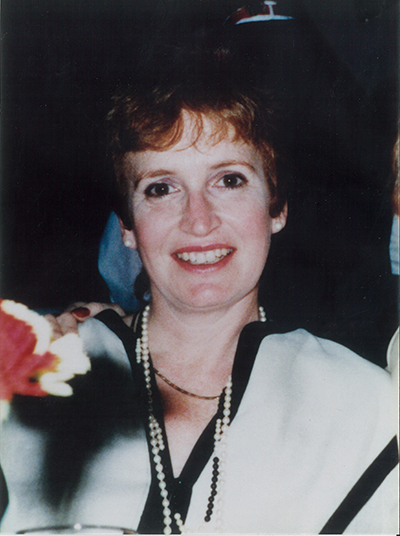 In 1993, nearing the end of a two year struggle with ovarian cancer, Barbara Stone Hollander ’60 and her husband, Tom, decided to consider what they wanted to leave behind irrespective of the outcome of her battle with the disease. Barbara had long desired to study at an all women’s college with a strong academic curriculum and had transferred from Penn State to Chatham in the second semester of her junior year. Chatham was always special to her. She loved every aspect of the school, as well as its proximity to Pitt where Tom was a law student. She was a fierce advocate for women’s rights and women’s leadership.
In 1993, nearing the end of a two year struggle with ovarian cancer, Barbara Stone Hollander ’60 and her husband, Tom, decided to consider what they wanted to leave behind irrespective of the outcome of her battle with the disease. Barbara had long desired to study at an all women’s college with a strong academic curriculum and had transferred from Penn State to Chatham in the second semester of her junior year. Chatham was always special to her. She loved every aspect of the school, as well as its proximity to Pitt where Tom was a law student. She was a fierce advocate for women’s rights and women’s leadership.
The summer after Barbara graduated from Chatham she and Tom were married. Barbara taught high school English for several years and earned a Masters Degree in English Literature and a Ph.D. in family therapy and organizational development at Pitt. She became a highly regarded family business consultant and advisor and was a founder of the international Family Firm Institute comprised of professionals who focus on family business issues. The Pittsburgh chapter bears her name.
Barbara had a strong sense of feminism and the need to advance women’s progress. At a young age she realized that the men in her life and all around her seemed to have more advantages than she did. She sensed that men and boys were more favored in the business community as well as in the structure of families. Tom said she felt strongly that this wasn’t fair. At Chatham Barbara had provided assertiveness training for women and became active in Chatham programs and in alumni activities. She became a member of the Board of Trustees and in that role chaired the search committee that brought Esther Barazzone to Chatham as its President.
The process of deciding what to leave behind was transforming. She knew exactly what she wanted to do. Our moribund preoccupation with the disease and its treatment was replaced by the excitement in planning and developing programs for women’s leadership training at Chatham. Barbara brought to this planning process her close friend and former professor at Chatham Carol Brown and President Barazzone. They drafted the documents that led to the establishment of The Barbara Stone Hollander Women’s Leadership Fund. Some of this activity occurred in her hospital room. Barbara died September 13, 1993.
Initial funding of The Barbara Stone Hollander ’60 Women’s Leadership Fund was begun soon after her death with a $50,000 bequest gift from Barbara’s estate and memorial gifts from others. Each year, an undergraduate woman is honored for her own leadership with a leadership experience with the goal of returning to Chatham and teaching others what she has learned. Among the experiences the award has made possible are an internship in Ghana with Women in Progress; a six-week course at the Food, Farm and Sustainability Institute at Hampshire College; and an internship at the United States Embassy in Luxembourg.
Every other year a distinguished woman leader who has had an impact on her community is invited to Chatham to receive the Barbara Stone Hollander ’60 Women’s Leadership Award and to give a lecture intended to inspire students and the community. This year’s recipient is Emmy Award-winning filmmaker and journalist Callie Crossley whose lecture is titled “Unreality Check: Journalism in the Era of Fake News.” Previous recipients have included Barbara’s friend Carol Brown, former president of the Pittsburgh Cultural Trust; former Congresswoman Allyson Schwartz; former Pennsylvania Supreme Court Justice Cynthia Baldwin and Joan Blades, co-founder of MoveOn.org. Award recipients are presented with a maquette of Jerry Caplan’s sculpture Metamorphosis which adorns the campus as his depiction of two women, one a young girl entering Chatham and the other leaving as an educated woman.
Tom reflected that some of the first speakers to receive the award knew Barbara personally. Tom imagines that Barbara would have been especially happy with the messages those speakers delivered to the Chatham community. “She would have loved every one of those people, as different as they were,” he said.
His late wife’s energy and enthusiasm for Chatham and women’s rights are still missed by Tom and others even as her work lives on through the Barbara Stone Hollander ’60 Award for Women’s Leadership. “She could get people to do things and get involved with programs and be energized,” he said. “She was a mover.”
